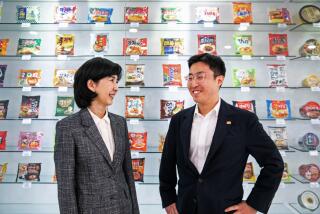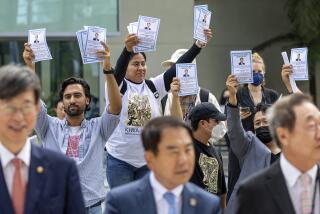Hyundai’s Unwanted Export
- Share via
At Hyundai Motor America Inc., two things have been on the rise: monthly sales figures and the number of executives walking out the door.
After struggling for 15 years in the United States, Hyundai has enjoyed soaring sales, thanks to an aggressive marketing campaign, sharper vehicle designs and improved product quality.
But this success hasn’t stopped an executive exodus from the South Korean automaker’s U.S. headquarters in Fountain Valley.
Since May, four top executives have quit. The latest to go was Hyundai Motor America’s president and chief executive, Finbarr O’Neill, who resigned in late August to head struggling Mitsubishi Motors Corp.’s North American unit in Cypress.
Various Hyundai insiders and analysts attribute the departures to heavy-handed management oversight from the Seoul-based parent company, Hyundai Motor Co.
Don Reilly, one of Hyundai’s first U.S. dealers and now chairman of the Hyundai Dealers Council, says Hyundai’s American executive team believes it is being micromanaged by higher-ups in South Korea.
The parent company “pretty much ignored them when things were not going well,” said Reilly, who owns two Hyundai dealerships in Virginia. But as sales have picked up in the last year or so, the American staff hasn’t been rewarded by being given a free hand, he added. Instead, Reilly said, executives here have “seen their authority decreased, their control over their budget decreased and their autonomy decreased.”
Hyundai Motor America spokesman Chris Hosford said it was “perfectly natural” that “major decisions would be reviewed by our parent company, just as they are at other import companies doing business in the U.S.” But he said any suggestions that Hyundai was exercising more oversight of its American operations than it did before were “simply incorrect.”
Oles Gadacz, Hyundai’s top corporate spokesman in South Korea, also rejected the idea that the parent company was driving out its top U.S. executives with an autocratic style: “There is no common thread among the departures. Each resignation was the result of unique circumstances and the personal reasons of each individual.”
In fact, Gadacz credited Hyundai’s success in the United States in part to the decision five years ago to end the practice of appointing Korean-born executives as CEO of the Fountain Valley unit and to allow “American executives to run the store.”
Many Japanese automakers went through management upheavals in the United States as their sales grew and North America became more important to the “corporation’s overall financial picture,” said Wes Brown, auto industry analyst with Iceology, a Los Angeles market consulting firm.
J. Ferron, head of the automotive practice at PricewaterhouseCoopers in Detroit, said, “It’s not unusual for American managers to have a Korean or Japanese shadow, and Hyundai, especially, is very authoritarian.”
One of the first Hyundai executives to depart was marketing Vice President David Weber, who reportedly quit a year ago after a new South Korean advertising liaison began countermanding him. Weber could not be reached for comment. Hosford, the company spokesman, declined to comment on any individual’s situation.
Weber’s exit was followed by the heads of Hyundai’s U.S. service, financing and product planning units this year.
It was O’Neill’s resignation, though, that raised the most concern among dealers.
O’Neill, who had worked as Hyundai’s U.S. corporate counsel for 11 years before becoming president in 1998, is widely credited with engineering the dramatic sales turnaround.
In August, Hyundai sold more vehicles in the United States than it had in any other month -- 41,073. That showing was driven by the growing demand for the Sonata mid-size sedan, the popular Santa Fe sport utility vehicle and the Elantra compact. In 2002, Hyundai’s U.S. sales were a record 375,119, more than four times those of 1998.
Hyundai, with a U.S. market share of 2.4%, is bigger than Japanese competitors Mitsubishi and Mazda Motor Corp. and outsells its sister company, Kia Motors America Inc., based in Irvine.
In an interview, O’Neill said he “wasn’t driven out” of his job at Hyundai. Rather, he said, Mitsubishi represents “an opportunity to join a company that has global reach and is poised for success.”
Although O’Neill publicly expressed fondness for Hyundai, where he was renegotiating his employment contract when he left, insiders say he voiced concerns that the parent company was unwilling to let U.S. managers operate autonomously.
One of Hyundai’s strong selling points is a 10-year or 100,000-mile powertrain warranty, a marketing plan developed in 1998 by recently resigned service division Vice President Chuck Halper and embraced wholeheartedly by O’Neill.
The warranty is the principal reason consumers buy Hyundai, said George Peterson, president of Tustin-based auto market research firm AutoPacific Inc.
Halper could not be reached for comment. But several associates said the success of the warranty program created jealousies among South Korean managers, who tired of seeing O’Neill’s team credited with the U.S. success and began criticizing Halper’s judgment.
Gadacz, the Hyundai spokesman in South Korea, dismissed that notion: “To ascribe corporate jealousies as a precipitating factor behind some of the departures is nonsense. Hyundai Motor America’s success is our success.”
Hyundai Group, controlled by the Chung family, is the largest of the South Korean chaebol, or family-run conglomerates. Hyundai Motor Co. has been set up as a separate entity but remains under family control.
O’Neill reported directly to executives in Seoul. But other managers in Fountain Valley have had to answer, at least indirectly, to James Choi, a South Korean executive who became vice president of finance last year at the U.S. headquarters. Choi’s decisions on spending have, in the eyes of some, derailed the plans of U.S. managers, according to one former Hyundai executive.
Hyundai named Robert Cosmai as acting president to replace O’Neill. Cosmai, former head of national sales, is popular with Hyundai’s U.S. staff and was recruited by O’Neill, whose policies he is likely to continue.
Despite Hyundai’s management turnover, “the overall outlook for the brand is good,” said Gary Tucker, a managing director at J.D. Power & Associates, a Westlake Village-based market research firm.
Reilly, the Hyundai dealer, said that although he and other dealers were saddened by O’Neill’s departure, they were grateful Cosmai has replaced him. If South Korean management gives enough license to its American team, Reilly said, “there’s no reason we won’t be able to meet the goal of a million annual sales in the U.S. by 2010.”
More to Read
Inside the business of entertainment
The Wide Shot brings you news, analysis and insights on everything from streaming wars to production — and what it all means for the future.
You may occasionally receive promotional content from the Los Angeles Times.










